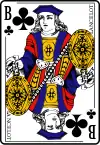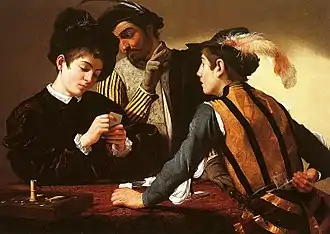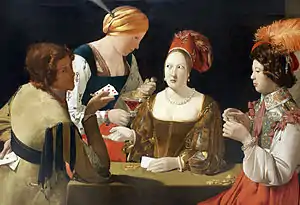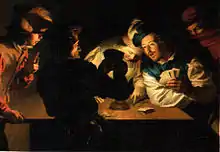Brandeln
Brandeln, sometimes Anglicized as Brandle,[1] is an historical card game for four players in which three play against a soloist. It is one of the earliest games to use the terms Bettel – a contract to lose every trick – and Mord - a contract to win every trick. It is still played in Germany today.
| "A delightful German Nap equivalent"[1] | |
 The top card when Clubs are trumps | |
| Origin | Germany |
|---|---|
| Alternative names | Brandle |
| Family | Trick-taking |
| Players | 4 |
| Cards | 28 |
| Deck | French or German |
| Play | Clockwise |
| Random chance | Easy |
| Related games | |
| Nap | |



History
Brandeln is recorded as early as 1829 in the Neuestes Allgemeines Spielbuch which states that its origin is uncertain, but that it is a thoroughly German game whose features were adopted by some of the "newer French and English games" and even by Ombre.[2]
Brandeln continues to be regularly published in German and Austrian games compendia from that time until the present day.
Rules
Cards
The game is played with 28 cards from a 32-card deck of French playing cards with the Eights removed.
Ranking
In the trump suit the Jack (Bube) and the Seven are the highest trumps; the ranking runs thus:
Jack > Seven > Ace > King > Queen (Dame) > Ten > Nine
In the other suits the ranking of card values for taking tricks is the usual:
Ace > King > Queen > Jack > Ten > Nine > Seven
Preparation
Seating and dealing is as per normal. Dealing, bidding and playing are all in clockwise order. Each player is dealt seven cards in packets of two, three and two again.
Bidding
The player to the left of the dealer is forehand and the first to bid.
- If he believes he can win three tricks in one of the four suits, which then become trumps, he says "Brandle" ("Ein Brandel") or "I'll brandle" ("Ich brandle").
- If he passes, bidding passes to the second, third and fourth players.
The bidder can also be outbid by 4, 5, 6 tricks, but can play the Brandel by which he is outbid, himself.
The player does not announce the suit in which he intends to "brandle" until he has won the auction.
If a player call a Bettel ("Beggar"), he is offering not to take any tricks. A Bettel beats a 6-trick Brandel.
The highest contract, which beats all the others, is Mord, in which is where a player has to take all 7 tricks.
Playing
The player who has announced the highest bid wins the auction and leads to the first trick.
Players must follow suit or, if not able to, play a trump. In a Bettel contract, in which there are no trumps, players must play a higher card if they can.
Scoring
Points for winning are awarded as follows:
- 3-trick Brandel - 3 points
- 4-trick Brandel - 4 points
- 5-trick Brandel - 5 points
- 6-trick Brandel - 6 points
- Bettel - 7 points
- Mord - 8 points
If the declarer (the winner of the auction) loses, he pays the 3 defenders the same amount each.
Over- and under-tricking does not count.
References
Literature
- _ (1829). Neustes Allgemeines Spielbuch. C. Haas, Vienna,
- _ (1983). "Brandeln" in Erweitertes Spielregelbüchlein aus Altenburg, Verlag Altenburger Spielkartenfabrik, Leipzig, pp. 54ff
- Grupp, Claus D. (1996/97) Kartenspiele im Familien und Freundeskreis. Revised and redesigned edition. Original edition. Falken, Niedernhausen/ Ts., ISBN 3-635-60061-X, pp. 57ff.
- Kastner, Hugo and Gerald Kador Folkvord (2005). Die große Humboldtenzyklopädie der Kartenspiele. Humboldt, Baden-Baden, ISBN 3-89994-058-X, pp. 124ff.
- Müller J. F. (1830). Neuestes Spiel-Taschenbuch. 2nd revised edn. J. Ebuerschen, Ulm.
- Parlett, David (1992/96) Oxford Dictionary of Card Games. Oxford University Press, Oxford/New York.
- Pieper, Sven and Bärbel Schmidt (1994) Kartenspiele. Reclams Universalbibliothek, Vol. 4216, Stuttgart.
- Pierer, Heinrich August and Julius Löbe (eds.) (1857). "Brandeln" in Universal-Lexikon der Gegenwart und Vergangenheit. 4th edition, Vol. 3. Altenburg, p. 179 (zeno.org).
- Von Alvensleben, L. (1853). Encyclopädie der Spiele, pp.143f